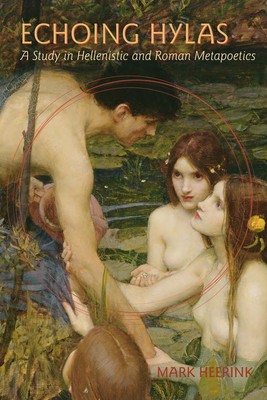
- We will send in 10–14 business days.
- Author: Mark Heerink
- Publisher: University of Wisconsin Press
- ISBN-10: 0299305406
- ISBN-13: 9780299305406
- Format: 15.8 x 23.1 x 2 cm, hardcover
- Language: English
- SAVE -10% with code: EXTRA
Reviews
Description
During a stopover of the Argo in Mysia, the boy Hylas sets out to fetch water for his companion Hercules. Wandering into the woods, he arrives at a secluded spring, inhabited by nymphs who fall in love with him and pull him into the water. Mad with worry, Hercules stays in Mysia to look for the boy, but he will never find him again . . .
In Echoing Hylas, Mark Heerink argues that the story of Hylas-a famous episode of the Argonauts' voyage-was used by poets throughout classical antiquity to reflect symbolically on the position of their poetry in the literary tradition. Certain elements of the story, including the characters of Hylas and Hercules themselves, functioned as metaphors of the art of poetry. In the Hellenistic age, for example, the poet Theocritus employed Hylas as an emblem of his innovative bucolic verse, contrasting the boy with Hercules, who symbolized an older, heroic-epic tradition. The Roman poet Propertius further developed and transformed Theocritus's metapoetical allegory by turning Heracles into an elegiac lover in pursuit of an unattainable object of affection. In this way, the myth of Hylas became the subject of a dialogue among poets across time, from the Hellenistic age to the Flavian era. Each poet, Heerink demonstrates, used elements of the myth to claim his own place in a developing literary tradition. With this innovative diachronic approach, Heerink opens a new dimension of ancient metapoetics and offers many insights into the works of Apollonius of Rhodes, Theocritus, Virgil, Ovid, Valerius Flaccus, and Statius.EXTRA 10 % discount with code: EXTRA
The promotion ends in 14d.22:08:53
The discount code is valid when purchasing from 10 €. Discounts do not stack.
- Author: Mark Heerink
- Publisher: University of Wisconsin Press
- ISBN-10: 0299305406
- ISBN-13: 9780299305406
- Format: 15.8 x 23.1 x 2 cm, hardcover
- Language: English English
During a stopover of the Argo in Mysia, the boy Hylas sets out to fetch water for his companion Hercules. Wandering into the woods, he arrives at a secluded spring, inhabited by nymphs who fall in love with him and pull him into the water. Mad with worry, Hercules stays in Mysia to look for the boy, but he will never find him again . . .
In Echoing Hylas, Mark Heerink argues that the story of Hylas-a famous episode of the Argonauts' voyage-was used by poets throughout classical antiquity to reflect symbolically on the position of their poetry in the literary tradition. Certain elements of the story, including the characters of Hylas and Hercules themselves, functioned as metaphors of the art of poetry. In the Hellenistic age, for example, the poet Theocritus employed Hylas as an emblem of his innovative bucolic verse, contrasting the boy with Hercules, who symbolized an older, heroic-epic tradition. The Roman poet Propertius further developed and transformed Theocritus's metapoetical allegory by turning Heracles into an elegiac lover in pursuit of an unattainable object of affection. In this way, the myth of Hylas became the subject of a dialogue among poets across time, from the Hellenistic age to the Flavian era. Each poet, Heerink demonstrates, used elements of the myth to claim his own place in a developing literary tradition. With this innovative diachronic approach, Heerink opens a new dimension of ancient metapoetics and offers many insights into the works of Apollonius of Rhodes, Theocritus, Virgil, Ovid, Valerius Flaccus, and Statius.

Reviews